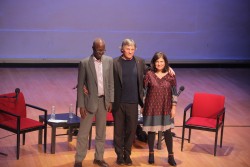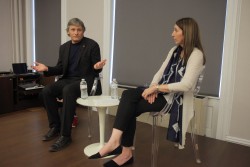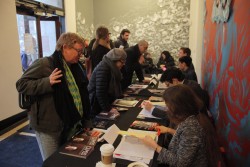
A spookily meticulous panel discussion. Three chairs, three microphones, two coffee tables, four bottles of water
Though she was booted from her original seat by a videographer, philosophy-ignorant Nadra Rahman got to attend Viggo Mortensen’s dramatic reading of author and philosopher Albert Camus’s “The Human Crisis,” in commemoration of the 70th anniversary of his trip to the United States. The Miller Theatre event was completely sold out, so you know it had to be good.
Albert Camus’s first and only trip to the United States began in New York, where he gave his lecture on “La Crise de l’homme,” the human crisis, on March 28, 1946. Exactly 70 years later, in the same building, actor Viggo Mortensen took the podium to deliver a dramatic reading of the speech, addressing an audience even larger than the one Camus had enjoyed. Whether the size of the audience was due to the public’s love affair with Camus or its gentle affection for ex-Lord of the Rings actors, we may never know.
Admittedly uneducated in the ways of both Camus and Tolkien, I wasn’t sure if I would enjoy or even understand the lecture. A Wikipedia search five minutes before the event yielded little relief, but I needn’t have worried—the material of the speech was relevant, accessible, and gripping. Mortensen, who was introduced as an “engaged artist” in opposition to American troops in Afghanistan, commanded the room; he spoke somberly as the lighting cast his cheekbones and glossy hair into relief.
With little preamble, he launched into the the speech, which is largely concerned with the troubling mindset taken up by many of Camus’s generation, those who had lived through the Great Depression and came of age during World War II. Viggo/Camus (for they became one and the same) spoke about his generation’s apathy by telling four short stories: one was about a landlady who didn’t want to get involved in her tenants’ (clearly destructive) business, the second about a torturer displaying a sort of superficial concern about a wound he himself had inflicted, the third about a mother who chooses which of her children must live and which must die at the hands of the Germans, and the fourth about a funeral gone awry. Taken as a whole, these stories illustrate the fact that Camus’s generation had come to view unspeakable death and torture with passivity, disinterest, or perhaps worst, mild concern; human suffering had become accepted as a part of life. Camus claimed this mindset made everyone “responsible for Hitler.”
They were introduced to war and violence while thinking this way—that there was no good and evil, or right or wrong, for it was the man who succeeded who was right. Efficiency trumped morals. Nothing but the forces of history were true. After the war, this poisonous way of thinking persisted.
But Viggo/Camus did not leave the audience without hope: he said along with pessimism, we had to feel a profound optimism. They had survived the war, even if it was because they had done less than others. They were obligated to create joy, justice, and meaning in a world that was unhappy, unjust, and absurd. He urged the audience to be modest, stand our ground, do our best work, and foster dialogue, to transform the world from one of police, soldiers, and money, to one of flesh-and-blood people.
He concluded by saying in a world “torn apart by terror,” those who judge anything by power sanction murder and mutilation.
As Professor Souleymane Bachir Diagne later noted in the panel discussion, the speech still resonates today, in a world still “torn apart by terror.” How many of us really protest or care about violence, war, and torture? How many of us superficially oppose them, without any great force of feeling or action? We are afflicted with the same malaise, the same expectation that suffering is a part of life. Thus, Camus’s demand in the end that we should strive to be fruitful in both work and leisure, and that it is possible to move through this world with optimism, was particularly poignant. We have to be firm in our principles, but it doesn’t have to be all gloom and doom. As for Mortensen’s performance, it carried the appropriate amount of gravitas and earnestness, but was not very dramatic (I think I had a flawed understanding of what a dramatic reading was).
At this point, the panel discussion broke out. Professor Diagne, head of the French department here, and Professor Alice Kaplan, head of French at Yale and the translator of the speech, along with Mortensen, talked about Camus’s reception history and stubbornness. Mortensen also discussed his 2014 film Far From Men, which is based on a Camus short story. At one point, Mortensen imitated a French bookseller reluctant to sell him Camus (for the author is apparently out of vogue there), passionately crying out, “Idiot! Fool!” In a French accent. Some Satre bashing ensued, and Professor Diagne speculated that Camus’s good looks might have contributed to Satre’s jealousy. One key point of the discussion was that it was important to contextualize Camus and his work in order to more fully understand his philosophy.
The event was a bit of an emotional downer, but it was also oddly inspiring. I might even read some Camus now.
Fun Facts:
- Viggo Mortensen made suggestions during the translation of the lecture. He’s pretty smart.
- I’ve never watched a Lord of the Rings film in its entirety.
- “There’s a Camus for every stage of life,” according to Professor Kaplan. The Stranger for adolescents, The Plague for college students, The Fall for the middle aged, and The First Man for the still older.
- When Camus gave this lecture, the proceeds were going to go to war orphans, but someone stole the money box. People in the audience dug into their pockets to make up the difference, and Camus was struck by the generosity of those New Yorkers, calling their it “spontaneous and unaffected.”
- “I may have rallied the Dead Men of Dunharrow, but really we should applaud the Rohirrim”
- “I looked up at the mass of signs and stars in the night sky and laid myself open for the first time to the benign indifference of the world.”
- Bwog does candid
- Everybody needs a little Camus in their life


 0 Comments
0 Comments



